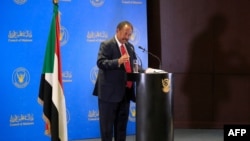Sudanese Prime Minister Abdalla Hamdok has named a new cabinet as he tries to push through major reforms and secure financing from foreign entities. The new cabinet includes leaders of rebel groups that signed a peace agreement with the government in the South Sudan capital, Juba, in October.
In a nationally televised announcement Monday night, Hamdok named the 20 new ministers, including Darfur rebel leader Gibril Ibrahim as finance minister. Hamdok also named Mariam Assadiq Al Mahdi, the leader of the popular Umma Party and daughter of a former prime minister, as Sudan’s foreign affairs minister. Khalid Omer of the Sudanese Congress Party was named minister for cabinet affairs.
Hamdok kept six members of his previous cabinet, including Justice Minister Nassruddin Abdulbari and Defense Minister Yasin Ibrahim.
A minister for general education has yet to be appointed due to what Hamdok described as “further consultations” but said the position would be filled soon.
During his address, Hamdok said the new cabinet is “inclusive.”
“This cabinet came as a result of a political consensus for a long period of discussions that took months and we were all concerned about how to preserve this country from the stage of collapse. As you have been observing in our regions, there are a lot of conflicts and challenges. Many countries have collapsed within the past few years and as Sudanese, we should not follow their footsteps in our country,” said Hamdok.
Hamdok said over the past year-and-a-half, his government was able to reform Sudanese laws and restore freedom across the country.
He noted the transitional government signed a peace deal with armed opposition groups and made it possible to remove Sudan from the U.S. list of countries that sponsor terrorism. In December, the United States said it would give Sudan a $1 billion loan to help clear its arrears to the World Bank and International Monetary Fund and pave the way for the country to receive renewed financial assistance.
Abdulhameed Awad, a journalist and political analyst with the Qatar-based Arabic newspaper Al Arabi Al Jadid, said despite those achievements, the new government faces many obstacles as Sudan struggles to repair its economy after decades of international sanctions under the 30-year rule of Omar al-Bashir.
Sudan lifted subsidies on fuel in October as part of an IMF-monitored reform program, causing sharp hikes in transportation fares and the prices of basic commodities. Sudan’s transitional government, however, hopes the reform program will open doors for development loans and direct foreign investment.
“There is no doubt that the new government is going to face a lot of economic, security and social complications. And they need to face these challenges with resilience and hard work, which need a huge financial support from the international community besides building up a true national unity of our people,” Awad told VOA’s South Sudan in Focus.
Awad believes restoring Sudan’s economy and improving people’s security and welfare should top the new government’s agenda.
“Prices of basic commodities such as vegetables, fruits, milk, sugar and meat are now very high in Sudanese market. This is a big problem. There are also serious shortages in bread and fuel. The new government needs to focus on these issues,” Awad told VOA.
Khartoum resident Amira Saleh welcomes the new cabinet and expects the economy to improve under its leadership.
“We have a lot of national resources in Sudan and if they are utilized in a good way it will increase our local production and our economy will improve. Let them also encourage foreign investors to come and invest in our resources and that way our local currency will get strong.”
Shortly after Hamdok’s announcement, Sudan’s Sovereign Council -- the military-civilian body that is the highest power in the transitional government -- held an extra ordinary session and endorsed the newly appointed ministers. The cabinet members are expected to be sworn in Wednesday afternoon.
During Hamdok’s announcement, demonstrators took to the streets in many states across Sudan to demand better living conditions. Local authorities in Al Obeid town in North Kordofan and Al Fashir of North Darfur shut down schools and imposed curfews in the two areas.
Other protests were reported Tuesday in Port Sudan and Nyala town of South Darfur against high prices and poor living conditions.
Sudan Prime Minister Hamdok Names New Cabinet
